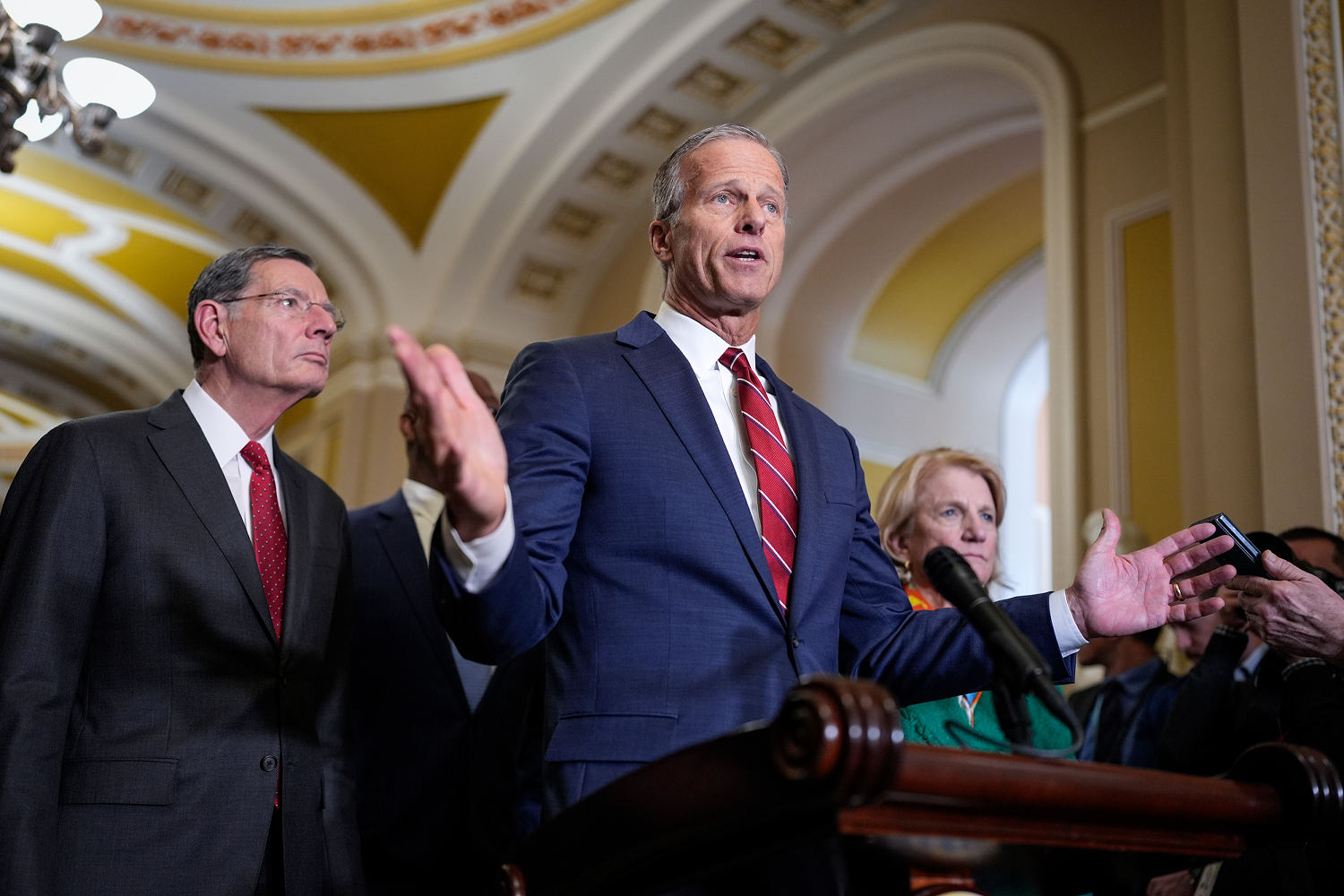
WASHINGTON — Senate Republicans managed to proceed to debate their massive budget plan Thursday night, but not before an unexpected delay caused by some of their own who have concerns about their strategy on tax cuts and potential cuts to Medicaid.
The delay occurred as those Republicans met with Senate Majority Leader John Thune, R-S.D., to talk through their concerns.
Some more centrist senators are worried about a budget change the party is using to slap a zero-dollar price tag on extending President Donald Trump’s tax cuts, which are estimated by the official scorekeeper in Congress to cost $4.6 trillion over a decade.
Republicans are delaying a reckoning over the issue after they bypassed the Senate parliamentarian on the question of whether they can use “current policy” baseline to treat extending Trump’s 2017 tax cuts, which are set to expire this year, as costing nothing. But that means the move could be challenged later, and it would potentially blow up the bill if the parliamentarian rules against it — unless the Senate votes to overrule her, which some have likened to nuking the 60-vote filibuster rule.
A handful of Republicans have concerns that they will be asked to do that later in the process.
“I will just speak for myself and say that I would never vote to overturn the parliamentarian,” Sen. Susan Collins, R-Maine, one of the senators who met with Thune, told NBC News.
And Thune insists Senate Republicans are just following the law, as he expects to plow through debate, amendments and approve the resolution this weekend. That would just be the beginning of the process.
“We wouldn’t have moved forward if we didn’t think we were clearly following the law, the Budget Act,” Thune said. “We got a long ways to go. But you know, the model that we’ve selected to pursue, we think checks all the boxes.”
Thune said he was “hearing folks out and obviously giving them a chance to one, explain their concerns and hopefully get some questions answered, and just make sure everybody had a comfort level with you know, proceeding.”
Senate Budget Committee Chair Lindsey Graham, R-S.C., insists he has sole power to decide whether extending Trump’s tax cuts should be scored as costing money and that the parliamentarian has no say.
“It’s not her decision, it’s mine,” he said.
Graham said that as long as there are 51 Senate votes to use that budgeting method, that’s all that matters. And if not? “Then that approach would fail. And I’d hate for the party to suffer that because I think current policy is good policy for the economy. I think that’s what President Trump wants, what I want,” he said in an interview.
He didn’t say what would happen if Democrats ask the parliamentarian to opine and she rules against the GOP approach, saying only that he doubts it will happen that way.
Another senator, Josh Hawley, R-Mo., said he has “a big concern” about the bill slashing Medicaid — and took his concerns directly to Trump in a phone call Thursday evening before the vote.
“I said there’s this language in the bill. And he said, ‘I want to be crystal clear about this: the House will not cut Medicaid benefits under any circumstance, the Senate will not cut Medicaid benefits under any circumstance, and I will not sign a cut to Medicaid benefits.’ So that’s good, and I hope our leadership will take that cue,” Hawley told reporters before the vote.
Twenty-one percent “of my state receives Medicaid — CHIP or Medicaid. So, I’ve made clear I’m not going to vote for Medicaid cuts. And I thought the president’s assurance to me tonight was completely unequivocal,” Hawley added, saying that assurance made him comfortable voting to begin the process.
That’s easier said than done. The House-approved budget, which Trump endorsed, makes it mathematically impossible for Republicans to achieve their targets without cutting Medicare or Medicaid. Lawmakers say they want to cut waste and fraud, along with imposing a potential work requirement for Medicaid. Beyond that, they haven’t identified ways to reduce spending.
Overall, GOP leaders say they want to find trillions of dollars in spending cuts to balance out the other side of the ledger after their tax breaks, as well as spending hikes on immigration enforcement and the military.
Buy they continue to lack consensus on what to cut.
Other Republicans remain optimistic that they’ll work it out.
Sen. Mike Rounds, R-S.D., who did not attend the meeting Thursday evening, said the leadership was “not twisting arms,” but “some folks wanted to make sure that they understood how the process worked. They sat down with a number of folks who were very familiar with it, and went through it. It took a little bit longer to get it done.”








